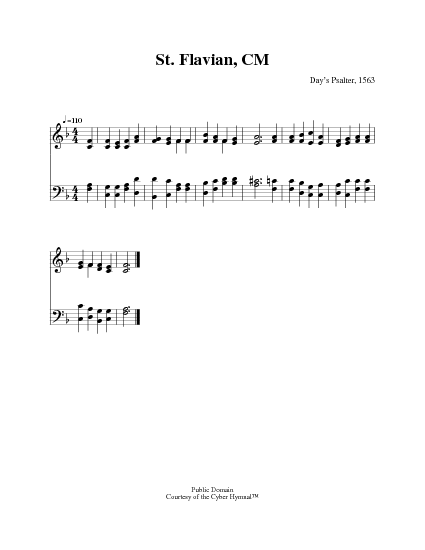- |
User Links
Salvation by Grace

Lord, we confess our numerous faults
Author: Isaac WattsPublished in 119 hymnals
Printable scores: PDF, MusicXMLAudio files: MIDI
Representative Text
1 Lord, we confess our num'rous faults,
How great our guilt has been,
How vain and foolish all our thoughts,
How deeply stained with sin.
2 But oh, my soul, forever praise,
Forever love, his name
Who turns your feet from dang'rous ways
Of folly, sin, and shame.
3 'Tis not by works of righteousness
Which our own hands have done,
But we are saved by God's free grace
Abounding through his Son.
4 'Tis from the mercy of our God
That all our hopes begin;
'Tis by the water and the blood
Our souls are saved from sin.
5 'Tis through the purchase of his death
Who hung upon the tree
The Spirit is sent down to breathe
On such dry bones as we.
6 Raised from the dead, we live anew;
And, justified by grace,
We shall appear in glory, too,
And see our Father's face.
Source: Christian Worship (1993): a Lutheran hymnal #398
Author: Isaac Watts
 Isaac Watts was the son of a schoolmaster, and was born in Southampton, July 17, 1674. He is said to have shown remarkable precocity in childhood, beginning the study of Latin, in his fourth year, and writing respectable verses at the age of seven. At the age of sixteen, he went to London to study in the Academy of the Rev. Thomas Rowe, an Independent minister. In 1698, he became assistant minister of the Independent Church, Berry St., London. In 1702, he became pastor. In 1712, he accepted an invitation to visit Sir Thomas Abney, at his residence of Abney Park, and at Sir Thomas' pressing request, made it his home for the remainder of his life. It was a residence most favourable for his health, and for the prosecution of his literary… Go to person page >
Isaac Watts was the son of a schoolmaster, and was born in Southampton, July 17, 1674. He is said to have shown remarkable precocity in childhood, beginning the study of Latin, in his fourth year, and writing respectable verses at the age of seven. At the age of sixteen, he went to London to study in the Academy of the Rev. Thomas Rowe, an Independent minister. In 1698, he became assistant minister of the Independent Church, Berry St., London. In 1702, he became pastor. In 1712, he accepted an invitation to visit Sir Thomas Abney, at his residence of Abney Park, and at Sir Thomas' pressing request, made it his home for the remainder of his life. It was a residence most favourable for his health, and for the prosecution of his literary… Go to person page >Text Information
| First Line: | Lord, we confess our numerous faults |
| Title: | Salvation by Grace |
| Author: | Isaac Watts |
| Meter: | 8.6.8.6 |
| Language: | English |
| Copyright: | Public Domain |
Notes
Lord, we confess our numerous faults. I. Watts. [Salvation by Grace.] First published in his Hymns & Sacred Songs, 2nd ed., 1709, Book i., No. 111, in 6 stanzas of 4 lines, and headed "Salvation by Grace." It is in common use in its full form, and also abbreviated and altered as:—
1. 'Tis not by works of righteousness. This arrangement begins with stanza iii. Its use is limited.
2. How wretched was our former state. In the Draft of the Scottish Translations and Paraphrases, 1745, Watts's hymn was given with alterations as No. 19, but in the authorized public worship issue of the Translations and Paraphrases, in 1781, it gave place to "How wretched was our former state," which was thus composed:—stanza i. new; ii. Watts; iii. new; iv. Watts and 1745; v. from 1745; vi. Watts and 1745; vii. from 1745. This recast has been in use in Scotland and elsewhere for more than one hundred years. It is sometimes attributed to W. Cameron (q. v.), but is not assigned to him in the markings, by Cameron's eldest daughter, of the Translations and Paraphrases. Its authorship is therefore doubtful.
3. 'Tis from the mercy of our God. This is a rewritten form of the Scottish Translations and Paraphrases, text, by Miss Jane E. Leeson, and was published in her Paraphrases and Hymns for Congregational Singing, 1853.
--John Julian, Dictionary of Hymnology (1907)


 My Starred Hymns
My Starred Hymns





